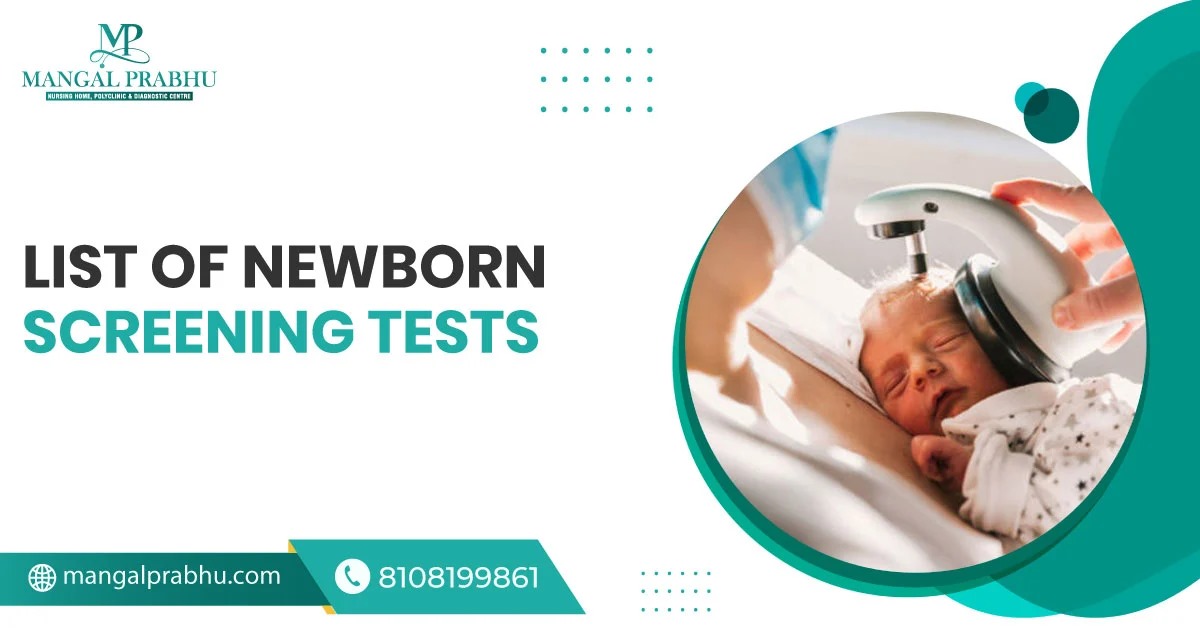
List of Newborn Screening Tests
When a baby is born, they are tested for severe yet rare medical conditions that can be fatal to the baby’s health if left undiagnosed and untreated. Your baby might not show signs of illness, so newborn screening tests are mandatory for all babies. Early detection is crucial, as it helps the pediatrician in Navi Mumbai identify problems that require medical attention.
If you are also close to your delivery date, knowing about different newborn screening tests is essential to childbirth preparation. Below, we’ve compiled a list of the common screening tests conducted at most children’s hospitals in Navi Mumbai.
Common Newborn Screening Tests
1) Hearing Screening:
The healthcare provider will use tiny microphones to detect how your baby responds to sound. The doctor connects the microphone to a monitor, which records the echo produced by your baby’s ears. The hearing test shows whether your baby has a normal hearing capacity.
2) Metabolic Disorder Screening:
Your baby will be tested for metabolic disorders before they leave the hospital. Metabolism refers to your body’s ability to convert food into energy. Problems with a newborn’s metabolism can lead to life-threatening consequences when left untreated. The healthcare provider will take a blood sample from your baby’s heel and send it to the lab for testing.
3) Critical Congenital Heart Disease (CCHD) Screening:
The pulse oximetry test is a simple test that detects heart disease in newborns. It takes barely five minutes and is performed using a sensor that detects the oxygen in your baby’s blood and pulse rate.
Conditions Detected by Newborn Screening
Newborns with metabolic disorders are unable to process foods properly. This can lead to a wide range of disorders, some of which can affect brain function and cause liver damage. Metabolism test detects problems like hypothyroidism, cystic fibrosis, sickle cell disease, Phenylketonuria, and galactosemia.
Most genetic disorders in newborns are related to their metabolism, blood function, and hormones. In addition to the above-listed issues, the test can detect Maple Syrup Urine Disease. This condition suggests your body’s inability to process certain amino acids, leading to their accumulation in the body. This may eventually result in brain damage. Spinal Muscular Atrophy is another genetic disorder that causes muscle weakness and respiratory issues.
What to Expect After Screening
If the test results are normal, you can go home. If one of the tests shows a positive, that doesn’t mean the baby has a disorder. The doctor will schedule further testing, often called confirmatory tests, to confirm the diagnosis.
If the confirmatory tests confirm the disorder, your healthcare provider will work with an endocrinologist, dietician, cardiologist, and other qualified pediatricians to plan the treatment.
Certain conditions detected in newborn screening require regular monitoring. You will be asked to monitor their developmental milestones and whether they are growing like normal babies.
Conclusion
Newborn screening tests are essential for every baby. The hospital will conduct these tests on the first or the second day of childbirth. Some hospitals send you a copy of the reports. You can have them cross-checked by your pediatrician.
